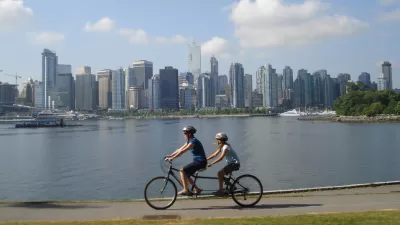Density is a loaded term that brings with it many negative connotations. But it can help solve "our city's toughest challenges." Brent Toderian discusses lessons from Vancouver on how to turn "the third rail of municipal politics" into an asset.
Although 'Vancouverism' may be hard to promote throughout Canada these days, it still serves as an enviable model of livable density to cities throughout the world. At a recent presentation to the Downtown Seattle Association's State of the Downtown Forum, Brent Toderian, former Chief Planner for the City of Vancouver, discussed how "every city can learn to make the D-Word a cornerstone for successful city-making."
"[W]hat I call "Density Done Well" is critically important for any city to avoid the damaging effects of sprawl, while solving our city's toughest challenges, from mitigating climate change, to supporting urban health, energy resiliency, affordability, economic success, creativity, safety, vibrancy and so on," he argues. "It can make your city much better, in many important ways."
"For these reasons and more, despite the political challenges, smart and successful cities worldwide are now tackling the D-Word head on, and looking to model cities who have learned how to do density well, often with the scars to show for it."
FULL STORY: Re-defining the D-Word: 'Density Done Well' in Vancouver

Trump Administration Could Effectively End Housing Voucher Program
Federal officials are eyeing major cuts to the Section 8 program that helps millions of low-income households pay rent.

Planetizen Federal Action Tracker
A weekly monitor of how Trump’s orders and actions are impacting planners and planning in America.

Ken Jennings Launches Transit Web Series
The Jeopardy champ wants you to ride public transit.

Philadelphia Is Expanding its Network of Roundabouts
Roundabouts are widely shown to decrease traffic speed, reduce congestion, and improve efficiency.

Why Bike Lanes Are Good: An Explainer for the US Transportation Secretary
Sean Duffy says there’s no evidence that bike lanes have benefits. Streetsblog — and federal agencies’ own data — beg to differ.

California Invests Additional $5M in Electric School Buses
The state wants to electrify all of its school bus fleets by 2035.
Urban Design for Planners 1: Software Tools
This six-course series explores essential urban design concepts using open source software and equips planners with the tools they need to participate fully in the urban design process.
Planning for Universal Design
Learn the tools for implementing Universal Design in planning regulations.
Ada County Highway District
Clanton & Associates, Inc.
Jessamine County Fiscal Court
Institute for Housing and Urban Development Studies (IHS)
City of Grandview
Harvard GSD Executive Education
Toledo-Lucas County Plan Commissions
Salt Lake City
NYU Wagner Graduate School of Public Service




























